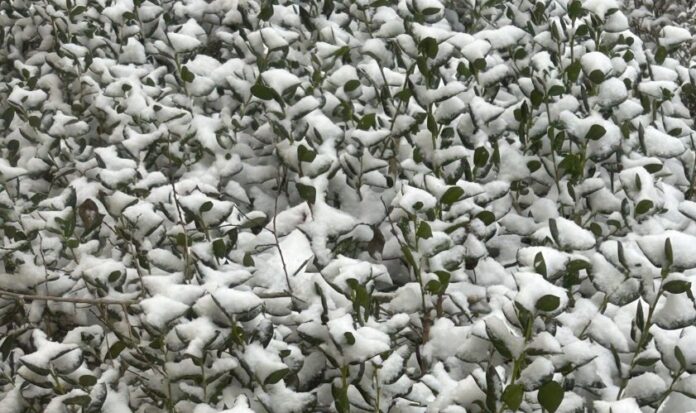AUBURN UNIVERSITY, Ala. — A historic snow event was not on Alabama’s bingo card for 2025, but January has already ushered in two significant winter events across the state. Snowfall in excess of 7 inches in south Alabama topped historical records and created a winter wonderland just two weeks after a significant snowfall occurred in north Alabama. After these snow events, many residents are concerned about the durability of their landscape plants.
As the snow melts, Carmen Flammini, an Alabama Cooperative Extension System regional home grounds agent, said it will be important to assess the state of the yard and garden before jumping into action.
“It can be tempting to run out to the garden, but patience and planning are essential,” Flammini said. “Snow-laden branches may still be falling because of the extra weight, and slippery spots are sure to be a barrier.”
Snow’s effects on the garden
Plants on the coast are not well adapted to prolonged periods of cold or snow, which makes it important to do an initial assessment.
“Summer and early fall plants will not survive snow or freezing temperatures,” Flammini said. “However, many plants are adapted to cold temperatures through dormancy and other evolutionary mechanisms.”
Flammini said snow is a problem when it melts and freezing temperatures return to threaten the plants with ice.
She recommends the following tips during a garden assessment:
- Do not shake snow or ice off plants aggressively.
- Check plants after the snow and ice have melted.
- Inspect leaves and roots for damage after the snow melts.
Garden recovery
While trees and shrubs may be hardier than vegetable crops and flowers, home gardeners will not know the full extent of the snow or cold damage until spring.
“Avoid pruning heavily at this time, as premature pruning may remove live tissue that the plant needs for recovery,” Flammini said. “Wait until spring growth begins to determine which parts of the tree or shrub are dead.”
While all winter vegetables have different reactions to snow or freezing temperatures, there are some that may survive when others will not.
“In general, leafy greens like kale and spinach may survive under snow,” Flammini said. “Also collards and cabbages often tolerate prolong cold temperatures. Onions and broccoli are less tolerant but can endure brief freezing, but it will depend what variety was planted. Root crops like carrots, radishes and turnips are moderately tolerant and would have required heavy mulching to prevent damage.”
Flammini said tropical or tender plants were at the highest risk because they are not accustomed to the low temperatures. Dormant perennial plants should have been protected by snow insulation.
Next steps
As temperatures return to seasonal norms, remove covers, ensure proper drainage, check for soil compaction and add a new layer of mulch. Flammini recommends holding off on a fertilizer application.
“Do not fertilize stressed plants until active growth resumes in the spring,” Flammini said. “Applying fertilizer too early could damage the roots.”
More information
Read Flammini’s full post-snow recommendations in the Extension Brief, “Garden Recovery After a Snow Event in Alabama.” For answers to other gardening questions, visit www.aces.edu or contact the home grounds regional agent in your area. Find contact information at www.aces.edu/directory.




















